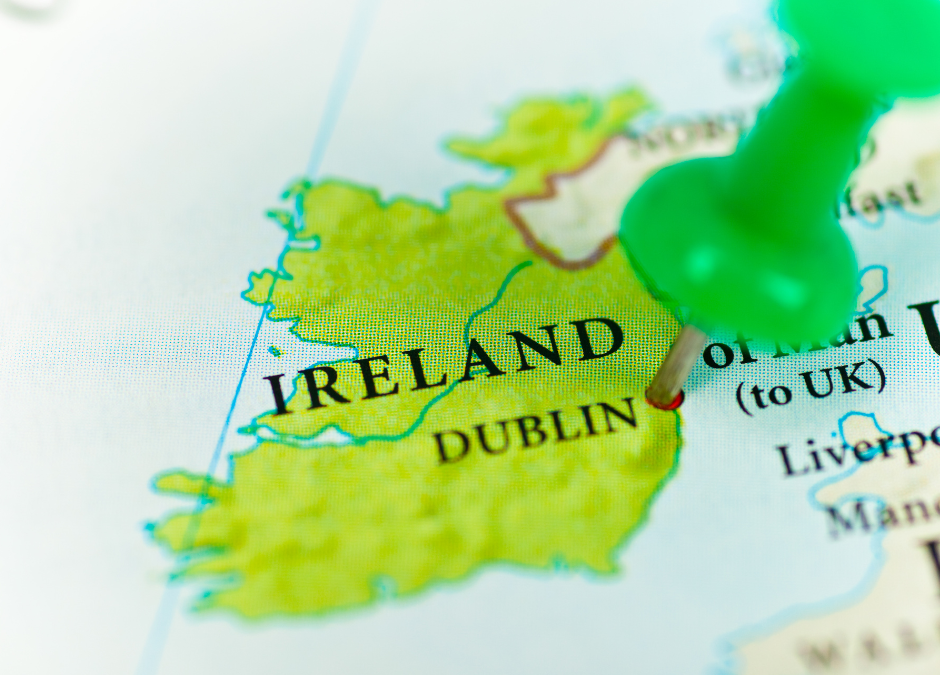A Brief Look at Judaism in This Overwhelmingly Catholic Country
St. Patrick’s Day is upon us…a holiday that celebrates the man who ostensibly brought Christianity to the Emerald Isle. It may come as a surprise to learn that, in a country where more than two-thirds of all people of faith belong to the Catholic Church, there has been a small, but vibrant, Jewish presence for more than a thousand years.
The Earliest Traces of a Jewish Presence in Ireland
Historians point to the year 1079, when it was reported in the Annals of Inisfallen that five Jews came to Toirdelbach, the King of Munster, bearing gifts. Nearly a hundred years later, in 1169, when the Normans invaded Ireland, they were funded in part by Jewish moneylenders. Records show that a Jewish merchant in Gloucester was fined for lending money to the insurgents.
Some 60 years later, there appears to be some type of Jewish settlement in Ireland, as there is documentary evidence that King Henry III (of England), when granting Peter de Rivel the title of “Treasurer and Chancellor of the Irish Exchequer,” also made him overseer of “the King’s Judaism in Ireland.” It is believed that most, if not all, of the Jewish community in Ireland at this time was in or near Dublin.
The Expulsion of the Jews from the English Kingdom
In 1290, Edward I issued the Edict of Expulsion, which formally prohibited Jews from having any presence anywhere within the British Empire. Historians believe that many Jews left Ireland, but that a small contingent, perhaps as many as 2,000, lived and practiced their faith in secret for centuries.
In 1657, Oliver Cromwell revoked the Edict of Expulsion. By the turn of the century, a permanent settlement of Jews was founded along Ireland’s southern coast.
Judaism Comes Out of Hiding in Ireland
In 1660, the first Jewish synagogue in Ireland was erected near Dublin Castle. It also became the location of the country’s first Jewish cemetery.
In 1714, Irish philosopher and statesman John Toland published a pamphlet calling for the naturalization of all Jews in Ireland. Initial efforts to get the Irish House of Commons to pass legislation accomplishing this objective were unsuccessful. In fact, Jews were specifically excluded from the Irish Naturalization Act of 1783. However, all exceptions under the act were abolished in 1846, at the insistence of Daniel O’Connell, the famed “liberator” of Irish Catholicism. Records indicate that, during the Great Famine, Irish Jews were active in organizing relief efforts and, according to one source, gave far more to help the poor than many of the wealthiest Irish Protestant landowners.
By 1874, Irish Jews even had an alderman in Dublin. Lewis Wormser Harris was elected first for the South Dock Ward, then was elected Lord Mayor of Dublin (in 1876). Unfortunately, he died before he could take office as mayor.
By the beginning of the 20th century, there were an estimated 5,000 Jewish people living in Ireland, with about half of them in Dublin. For most of the last 125 years, the story of the Jewish presence in Ireland is one of tolerance. A notable exception was the so-called Limerick Boycott, instigated by Father John Creagh, who called for the boycott in a sermon. Though there were some incidents of violence and agitation against Jews in Limerick, the overwhelming response was one of support for the Jewish community. Journalist Standish O’Grady, in his publication All Ireland Review, lambasted the boycott, call the Jewish people and the Irish people “brothers in a common struggle.” The Catholic church responded swiftly, removing Father Creagh from his parish, initially transferring him to Belfast, but ultimately shipping him to the other side of the world, a parish in Western Australia.
The Jewish Involvement in the Irish War of Independence
Irish Jews played key roles in the struggle for independence. Solicitor Michael Noyk successfully represented Irish Republicans captured by the British. Robert Briscoe, a member of the Irish Republican Army, worked closely with rebel leader Michael Collins, traveling to Germany at Collins’ request to secure weapons for the IRA. Collins found refuge in Jewish homes, was said to don Jewish attire to avoid British authorities and is even believed to have cursed at the British in Yiddish.
Gutterman’s and Gutterman Warheit—Serving the Jewish Community for Five Generations
At Gutterman’s and Gutterman Warheit, we bring more than 125 years of experience to individuals and families within the Jewish communities in New York and Florida, offering comprehensive and compassionate funeral and burial services. We understand the distinct customs within each Jewish tradition and can answer your questions and offer guidance on any matter, from the order of service at the memorial to the choice of a casket or monument, preparations for sitting Shiva or the creation of a Yahrzeit calendar. We will also be your liaison with the Chevra Kadisha, ensuring that the body has been prepared according to Jewish law before interment.
To learn how we can be of assistance, contact us by email or call us at one of the numbers listed below.
Gutterman’s & Gutterman Warheit — Where Relationships Matter
Family Owned and Operated Since 1892
Rockville Centre: (516)764-9400 | Woodbury: (516)921-5757 | Brooklyn: (718)284-1500
Boca Raton, FL: (561)997-9900 | (800)992-9262

